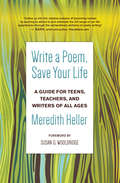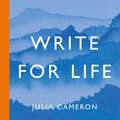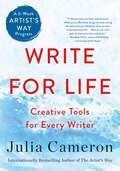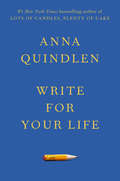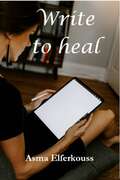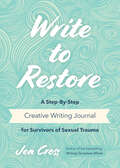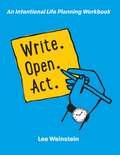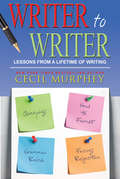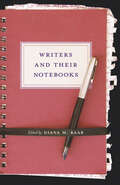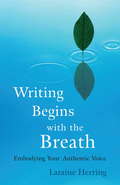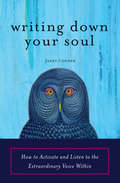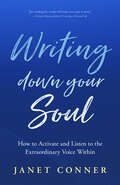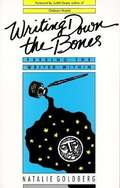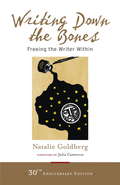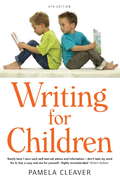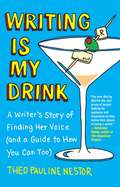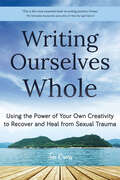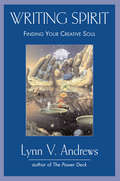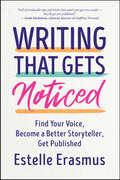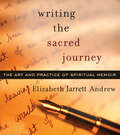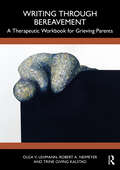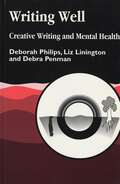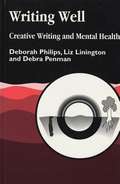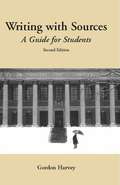- Table View
- List View
Write a Poem, Save Your Life: A Guide for Teens, Teachers, and Writers of All Ages
by Meredith Heller&“Join Heller on her quest to help save the world, one poet at a time.&” — from the foreword by Susan G. Wooldridge Write a Poem, Save Your Life helps writers of all ages and experience levels navigate their way through all aspects of life. With writing prompts, tools, encouragement, and moving student examples, Meredith Heller gently guides us in the art of using poetry to figure out who we are and what matters to us and to heal the deeper issues many of us face, such as depression, addiction, health and body image issues, low self-esteem, trauma, gender and sexual identity issues, and home and family problems. Along the way, we learn that writing poems helps us believe in ourselves, make positive life choices, and find direction, purpose, and meaning.
Write for Life: A Toolkit for Writers
by Julia CameronLegendary author of The Artist's Way Julia Cameron has pioneered the field of creative recovery, inspiring millions of people around the world to discover their true creative selves. Now in Write for Life, the 'Queen of Creativity' speaks directly to writers - it is an openhearted invitation to begin, stick with, and finish a project.Write for Life delivers a wonderful balance of firm and inspiring advice, shaped into a 6-week program for writers of all levels. From setting daily writing quotas to changing genres, fighting perfectionism to polishing a first draft, Julia Cameron provides holistic guidance and support every step of the way.Write for Life is for every writer, and every writer should have it. It is Julia Cameron at her best, distilling decades of wisdom and experience in practical lessons on the craft and spiritual practice of writing. It is an unmissable addition to Julia Cameron's creative canon, destined to sit in the pantheon of classic works on writing.
Write for Life: Creative Tools for Every Writer (A 6-Week Artist's Way Program)
by Julia CameronA 6-Week Artist’s Way ProgramJulia Cameron has been teaching the world about creativity since her seminal book, The Artist’s Way, first broke open the conversation around art. Now, in Write for Life, she turns to one of the subjects closest to her heart: the art and practice of writing.Over the course of six weeks, Cameron carefully guides readers step by step through the creative process. This latest guide in the Artist’s Way Series:- Introduces a new tool and expands on powerful tried and true methods. - Gently guides readers through many common creative issues — from procrastinating and getting started, to dealing with doubt, deadlines, and “crazymakers.”- Will help you reach your goals, whether your project is a novel, poetry, screenplay, standup, or songwriting.With the learned experience of a lifetime of writing, Cameron gives readers practical tools to start, pursue, and finish their writing project. Write for Life is an essential read for writers who have completed The Artist’s Way and are looking to continue their creative journey or new writers who are just putting pen to paper.
Write for Your Life
by Anna QuindlenIn this clarion call to pick up a pen and find yourself from &“one of our most astute chroniclers of modern life&” (The New York Times Book Review), #1 New York Times bestselling author Anna Quindlen shows us how anyone can write, and why everyone should. What really matters in life? What truly lasts in our hearts and minds? Where can we find community, history, humanity? In this lyrical new book, the answer is clear: through writing. This is a book for what Quindlen calls &“civilians,&” those who want to use the written word to become more human, more themselves. Write for Your Life argues that there has never been a more important time to stop and record what we are thinking and feeling. Using examples from past, present, and future—from Anne Frank to Toni Morrison, from love letters written after World War II to journal reflections from nurses and doctors today—Write for Your Life vividly illuminates the ways in which writing connects us to ourselves and to those we cherish. Drawing on her personal experiences not just as a writer but as a mother and daughter, Quindlen makes the case that recording our daily lives in writing is essential. When we write we not only look, we see; we not only react but reflect. Writing gives you something to hold onto in a changing world. &“To write the present,&” Quindlen says, &“is to believe in the future.&”
Write to Heal
by Asma ElferkoussWhat if your liberation was already within reach! Through practical tips and concrete exercises, this book allows you to liberate your thoughts, your emotions and your imagination...
Write to Restore: A Step-By-Step Creative Writing Journal for Survivors of Sexual Trauma
by Jen CrossUsing Your Words to HealA holistic approach to recovering from trauma. Creative writing is increasingly becoming a go-to method for trauma recovery. There is great power in the written word, and even more so when those words are our own. Journaling provides a cathartic release of emotions because it allows us to not only process past experiences but also reflect on how we’re feeling in the present moment. In this way, writing is one of the most easily accessible self-care practices.Give voice to what has been silenced. Healing from trauma can be a slow and painful process, especially for sexual trauma survivors, who are often shamed into keeping their experience to themselves. This companion journal to Jen Cross's book Writing Ourselves Whole is a space to put the pain on a page, and in doing so, release the hold it has on us and restore our bodies and minds.Creativity as a tool for change. Trauma and violence leave a distinct mark on our lives, one that is not easily erased. Writing on our own or with a community or group can be an extremely transformative process for creating change both within ourselves and socially. It encourages discussions about mental and emotional health that lead to finding more approaches to healing.Jen Cross has worked with sexual trauma survivors for over fifteen years and founded an organization that is devoted to creating spaces for survivors to write and talk about their experiences. In this self-help journal, you will find:A 60-day guided journey to healing from your experienceSixteen writing exercises that gently prompt writers deeper into their experiences and into renewalFollow-up readings, additional exercises, and suggested uses for your writingIf you’ve worked through books such as Start Where You Are, Healing the Wounded Heart, and Present, Not Perfect then Our Words Restore Us will provide further support and restoration for your healing process.
Write, Open, Act: An Intentional Life Planning Workbook
by Lee WeinsteinAS SEEN IN THE NEW YORK TIMES! If life were a project and you knew you had a limited time to get it done, wouldn't it make sense to develop a plan? "Write, Open, Act: An Intentional Life Planning Workbook" delivers a life of promise and purpose. No one wants to be lying on their deathbed wishing they would have done this or that. <P><P> This book helps people achieve their life dreams, even when day-to-day issues get in the way. Author Lee Weinstein is a former Nike public relations leader. One Saturday, he and his wife, Melinda, pulled out a large sheet of butcher paper and invented a process they call "Intentional Life Planning." It began with a conversation about where they wanted to live. This led to their looking at the decades they had ahead and the key upcoming milestones for their family, and imagining what they wanted to do with their lives. <P><P> They ended up creating a highly visual Intentional Life Plan-a timeline filled with dreams and goals-that they've updated every year since. When they shared photos of their annual planning day on Facebook, friends went crazy. Many asked how they, too, could get started. And several asked them to turn their process into a workshop, which they did. Their next move was to publish "Write, Open, Act" to bring the Intentional Life Planning method to a wider audience to explore on their own. <P><P> This practical, hands-on workbook is life-changing. Use the four steps in "Write, Open, Act" to build a visual Intentional Life Plan and chart your plan in less than a day. Written for people of all walks of life, the book gives readers an actionable process that is highly visual, with original illustrations and inspirational messages sprinkled throughout. After completing the workbook, you will have a plan for how to live your best life on this planet!
Writer to Writer: Lessons from a Lifetime of Writing
by Cecil MurpheyVeteran author Cecil (Cec) Murphey made a double commitment when he started writing professionally: (1) He would never stop learning and improving, and (2) He would do whatever he could to help other writers. This book is part of that commitment.In Writer to Writer, Cec shares valuable, bite-sized lessons he's learned on his journey, such as:* How to get beyond the amateur look;* Why writing articles is a good place to start;* The importance of showing and telling;* Choosing the best words and tenses;* Using dialog to move your story along;* Writing from the right perspective;* Keeping your reader happy;* Working with publishers, editors, and agents;* Making a living as a writer.It's possible to become an excellent writer, and the tips and advice provided in Writer to Writer from a master at his craft promise to guide you on the right path.Note: WRITER TO WRITER is a previously published work, and is not substantially different from the original edition.
Writers and Their Notebooks
by Diana M. RaabPersonal reflections on the vital role of the notebook in creative writing, from Dorianne Laux, Sue Grafton, John Dufresne, Kyoko Mori, and more.This collection of essays by established professional writers explores how their notebooks serve as their studios and workshops—places to collect, to play, and to make new discoveries with language, passions, and curiosities. For these diverse writers, the journal also serves as an ideal forum to develop their writing voice, whether crafting fiction, nonfiction, or poetry. Some include sample journal entries that have since developed into published pieces. Through their individual approaches to keeping a notebook, the contributors offer valuable advice, personal recollections, and a hearty endorsement of the value of using notebooks to document, develop, and nurture a writer’s creative spark.
Writing Articles That Sell
by Louise BoggessHave you ever thought you have what it takes to write articles for magazines? If so, this is the book for you. Each chapter of this book gives advice on different aspects of writing articles from coming up with good ideas to using characters and controversy. Each chapter gives helpful examples and writing exercises to help you sharpen your skills. Louise Boggess was a homemaker with two teenaged daughters when her husband died suddenly. Without marketable skills, she enrolled in college and began to learn to write to support her family. She shares what she's learned with clarity and warmth.
Writing Begins with the Breath: Embodying Authentic Voice
by Laraine HerringIn this distinctive guide to the craft of writing, author Laraine Herring shows us how to tune into our bodies and connect with our emotions so that our writing becomes an expression of our full beings, rather than just an intellectual exercise. With warmth and wisdom, Herring offers a path to discovering "deep writing"--prose that is unique, expressive, and profoundly authentic. Lessons and imaginative exercises show you how to: stay with your writing when your mind or body starts to pull you away; explore the five senses in your writing; and approach your writing without judgment.Writing Begins with the Breath will open up a whole world of creativity for people who may not have considered themselves writers before, while also providing keen insights into the craft for seasoned writers.To learn more about the author, Laraine Herring, visit her website at www.laraineherring.com.
Writing Down Your Soul: How to Activate and Listen to the Extraordinary Voice Within
by Janet ConnerChannel your divine inner wisdom and the miraculous, life-changing power of writing with this guide by the author of Find Your Soul&’s Purpose. A writer, poet, and spiritual field guide, Janet Conner is first and always a deep soul explorer. Through her own meditative writing practice, she has learned to open a channel to her divine inner voice. In Writing Down Your Soul, Janet shows you how to turn journal-writing into a divine dialogue with the wisdom that dwells just below your conscious awareness. Today, research scientists are providing peeks into the nature of consciousness. Their findings give us intriguing clues as to what is actually happening with our bodies, minds, and spirits as we roll pen across paper. Writing Down Your Soul explores some of this research and instructs how to access the power and beauty of our own deepest selves by slipping from the alpha brainwave state into the theta: the intriguing border between the conscious and the subconscious.
Writing Down Your Soul: How to Activate and Listen to the Extraordinary Voice Within
by Janet Conner&“This book is a powerful tool to help you access this deeper realm of consciousness and put it to work enriching your life . . . immediately.&” —August Gold, author of The Prayer Chest#1 Bestseller in New Age & Spirituality, Graphology, Parapsychology, Handwriting Analysis, Creativity, and Journaling Janet Conner is a writer, poet, and spiritual field guide, but first and always a deep spiritual soul explorer. Since she discovered how to activate a divine Voice by slipping into the theta brain wave state (border between the conscious and the subconscious) while writing, Janet has dedicated herself to exploring and sharing what it means to live at the vibrant intersection of the visible and the invisible. After hitting rock bottom while escaping domestic abuse, Janet&’s inner voice told her to start writing. As she wrote, she gained clarity and strength, and felt an incredible connection to the divine. Today, research scientists are providing peeks into consciousness and how it works. Their findings give clues about what is happening in our bodies, minds, and spirits as we roll pen across paper. Writing Down Your Soul explores this research and instructs how to access the power and beauty of our deepest selves. If you want to engage in a vibrant conversation with the wisdom that dwells just below your conscious awareness, write. Write every day, at approximately the same time, with passion, honesty, and the intention of speaking with and listening to the voice within.&“If you think this book is not for you because you are a writer and don&’t need another writing book, think again!&” —Sherry Richert Belul, author of Say it Now
Writing Down the Bones: Freeing the Writer Within
by Natalie GoldbergNatalie Goldberg's word-of-mouth hit has sold well over half a million copies. Goldberg, who has conducted writing workshops for both beginners and professionals all over the United States, sees writing as a practice that helps us comprehend the value of our lives. With insight, humor, and practicality, she inspires writers and would-be writers alike to take the leap into writing creatively and well.
Writing Down the Bones: Freeing the Writer Within (Shambhala Pocket Classics Ser.)
by Julia Cameron Natalie GoldbergFor more than thirty years Natalie Goldberg has been challenging and cheering on writers with her books and workshops. In her groundbreaking first book, she brings together Zen meditation and writing in a new way. Writing practice, as she calls it, is no different from other forms of Zen practice--"it is backed by two thousand years of studying the mind."This thirtieth-anniversary edition includes new forewords by Julia Cameron and Bill Addison. It also includes a new preface in which Goldberg reflects on the enduring quality of the teachings here. She writes, "What have I learned about writing over these thirty years? I've written fourteen books, and it's the practice here in Bones that is the foundation, sustaining and building my writing voice, that keeps me honest, teaches me how to endure the hard times and how to drop below discursive thinking, to taste the real meat of our minds and the life around us."
Writing For Children, 4th Edition: How To Write For Children And Get Published
by Pamela Cleaver'If you want to write because you have wonderful ideas that excite you, that you want to share with children, then you should go ahead and write it.' There is no one right way to write a children's book but if you are armed with a knowledge of certain techniques that have worked for other writers you will be more likley to succeed. This new edition combines Pamela Cleaver's bestselling Writing a Children's Book with her Ideas for Children's Writers. In it you will learn about plotting and planning, beginnings, middles and endings, how to research and how to revise and how to find a publisher. There are: - Lists of attributes to help you create interesting and believable characters - Lists of plots and themes - Genres - what's hot and what's not - Locations and how much desciption to use - List of do's and don'ts regarding submitting manuscripts - Symbols for correctiong your proofs - Tips on how to publicise your book
Writing Is My Drink
by Theo Pauline NestorWhether you're aiming for a New York Times bestseller or a short personal essay to share with family and friends, a popular blogger and memoirist shows you the way in this witty writing guide and disarmingly candid account of discovering her own voice."Theo Pauline Nestor has a big heart and a real feel for the pain and craziness of human life," wrote Pulitzer Prize-winning author Frank McCourt. This couldn't be truer in Writing Is My Drink, part memoir, part inspirational writing guide that tells the absorbing, poignant, and at times hilarious story of how Nestor found her voice as a writer. Nestor pulls no punches as she tells the stories of her life, from the darkest, most intimate moments, dealing with her alcoholic parents and the deaths of her beloved stepfather and grandmother to experiencing writer's block and the thrilling moment when she first realizes she's written something of value. With sweetness, humor, and charming candor, she shows aspiring writers how to tap into their own stories and unlock their potential. In addition, in her "Try This" sections at the end of each chapter, Nestor challenges you to take risks and deeply consider why you are writing and what you want to achieve. She also discusses successes and failures from her own life to demonstrate the challenges all writers face as well as the joys that come from tackling your dreams. With her witty, compelling, and wonderfully authentic voice, Nestor is an inspiring writing guru, whose own journey is sure to captivate and inspire.
Writing Ourselves Whole: Using the Power of Your Own Creativity to Recover and Heal from Sexual Trauma
by Jen Cross#1 Best Seller in Obsessive Compulsive Disorder (OCD) and Study Aids - A Book That Will Change Your LifeHealing victims of sexual assault through transformative journaling. One in six women is the victim of sexual assault. Using her own hard-won wisdom, author Jen Cross shows how to heal through journaling and personal writingRape victims and victims of other sexual abuse. Writing Ourselves Whole is a collection of essays and creative writing encouragements for sexual trauma survivors who want to risk writing a different story. Each short chapter offers encouragement, experience, and exercises.How to change your life. When you can find language for the stories that are locked inside, you can change your life. Talk therapy can only go so far for the millions of Americans struggling in the aftermath of sexual abuse and sexual assault. Sexual assault survivors can heal themselves. Sexual trauma survivor communities (and their allies) have the capacity to hold and hear one another's stories–we do not have to relegate ourselves solely to the individual isolation of the therapist's office.What You'll Learn Inside Writing Ourselves Whole:How to reconnect with your creative instinct through freewritingHow freewriting can help you reclaim the parts of yourself and your historyHow "restorying" the old myths about sexual trauma survivors can set you freeIf you have read books such as Julia Cameron's The Artist's Way, Natalie Goldberg's Writing Down the Bones, or Louise DeSalvo's Writing as a Way of Healing, your will want to read Writing Ourselves Whole.
Writing Spirit
by Lynn AndrewsYou are a writer. Your act of power is the book or the story that you are creating. It is now time for you to bloom. -fromWriting Spirit In Writing SpiritLynn Andrews discusses her own path to becoming a writer, complete with all the struggles she has faced along the way. By giving examples from her life and examining specific pieces of her own work, she explores the process of writing from beginning to end, and imparts her knowledge to novice and experienced writers alike. Writing Spiritaddresses particular issues such as: - Why are you writing? - Who are you writing for? - How can you be true to yourself as an artist? - What are some of the causes of and solutions to writer's block? Not straying from her spiritual roots, Andrews explains how being true to your spirit is the key to fulfillment in your work. She leads us on a journey to finding the truth within ourselves and teaches us what it really means to be a writer.
Writing That Gets Noticed: Find Your Voice, Become a Better Storyteller, Get Published
by Estelle ErasmusSelected as one of the Best Books for Writers by Poets & Writers Successful essayist, columnist, writing instructor, and editor Estelle Erasmus will show you how to find your voice, write stellar pieces, and get published. In real-world, experience-based chapters, she coaches you to: • mine your life for ideas and incubate those ideas • choose the perfect format — essay, op-ed, feature article, and more • research publications and follow editor etiquette • craft a perfect pitch • protect your psyche from rejection • revise your work for maximum impact • deliver what you promise, protect your work, and get paid
Writing The Sacred Journey: The Art and Practice of Spiritual Memoir
by Elizabeth Jarrett Andrew“Here is the definitive handbook for those courageous souls taking on the creative and ethical challenge of writing a spiritual memoir.—Frederic and Mary Ann Brussat, Spirituality & Practice In Writing the Sacred Journey, readers will discover how to construct a well-crafted spiritual memoir—one that honors the author's interior, sacred story and is at the same time accessible to others. Award-winning writer and teacher Elizabeth Jarrett Andrew provides practical advice on how to overcome writing obstacles as well as guidance for transforming the writing process into a spiritual practice. A writing instructor and spiritual director, Andrew teaches spiritual memoir at Wisdom Ways Center for Spirituality in St. Paul, Minneapolis.
Writing Through Bereavement: A Therapeutic Workbook for Grieving Parents
by Robert A. Neimeyer Olga V. Lehmann Trine Giving KalstadThis workbook is designed to help bereaved parents find words for grief in their quest for well-being after the devastating death of a child by offering a hands-on approach to therapeutic writing that can be used as a means of self-help, in collaboration with therapists, or in the context of support groups featuring writing for well-being.The book presents a seven-week therapeutic writing program that integrates field-tested writing techniques with general psychoeducation around grief and related emotions as well as the quest for meaning in a life transformed by loss. Each module shares a common structure, checking in with the writer, introducing a theme for the week, and providing specific prompts to safely engage the loss, explore the emotions it engenders, and foster more adaptive meaning-making about a devastating life experience. Readers are given the opportunity to tailor the brief immersive writing to their unique circumstances, and to respond to reflective questions that invite greater clarity and self-compassion as they attempt to re-enter life following loss. In this respect, the book acknowledges the diversity of ways that parents can adapt to the loss of a child and offers practical counsel and self-reflective tools to support them in this effort.Bereaved parents, grandparents, and family members will find the workbook to be a valuable resource as they work to cope with their grief. It will also be of use to professionals who want to facilitate writing courses for bereaved parents or provide them with individual support.
Writing Well
by Deborah Philips Liz Linington Debra PenmanWriting Well is a practical handbook of creative writing exercises which forms the basis of an indirect, nonconfrontational approach specifically intended for therapeutic use within the mental health field. Although people with emotional or psychological problems can find creative writing particularly difficult and unsettling, when writing courses are sensitively designed they are known to be of therapeutic benefit to people with mental health problems. The exercises are taken from the authors' successful practice with groups of people from a range of backgrounds in a variety of settings. The book is structured to be accessible and easy to use. The warm-ups and main exercises are organised by themes, such as positive memories, imagined worlds, changes and painful feelings. Guidelines are given for developing and adapting the exercises and practical suggestions for materials are included in the appendix. This volume will be an invaluable practical resource and imaginative inspiration for creative writing tutors and mental health professionals.
Writing Well: Creative Writing and Mental Health
by Deborah Philips Liz Linington Debra PenmanThis is a book for those who are professionally working with people learning to write, and is intended for creative writing groups in which the practice of writing is primarily for its therapeutic benefits, rather than for the production of elegant poetry and prose. This handbook has grown out of our own experiences in work with psychiatric patients in a range of different institutions, and although it is not restricted to use in a mental health context, it has been designed with that specifically in mind.
Writing With Sources: A Guide For Students 2nd Edition
by Gordon HarveyDeveloped for Harvard University's Expository Writing Program, Writing with Sources describes the main principles and methods of integrating and citing sources in scholarly work, and provides cogent guidance on avoiding the misuse of sources. The second edition of Writing with Sources is updated throughout, and includes new material on the roles sources play in argument, on assessing the reliability of sources, and on attitudes about writing that can lead to plagiarism.
